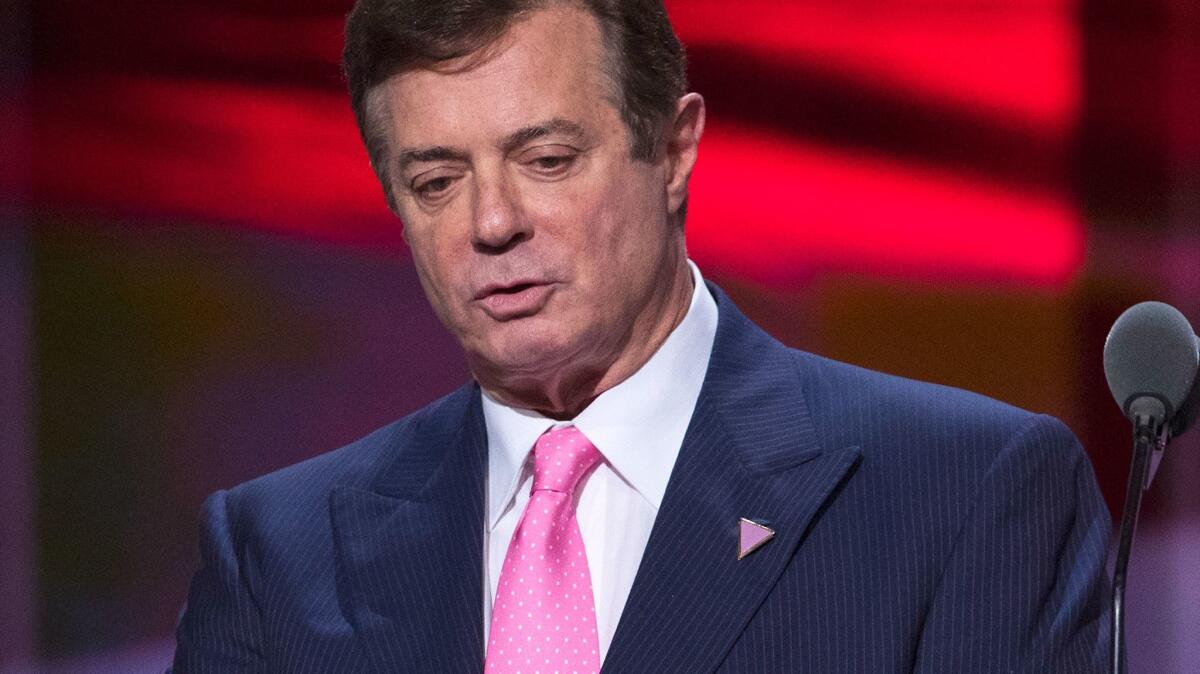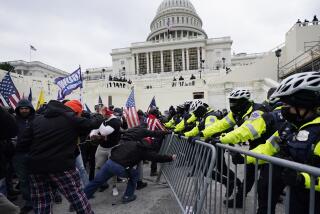First charges against former Trump aides reveal an aggressive strategy by Mueller

Reporting from Washington — The first criminal charges filed in the investigation of President Trump’s campaign aides and Russia’s meddling in the 2016 election come straight from a well-thumbed playbook of white-collar crime prosecutions — reward defendants who cooperate, drop the hammer on those who won’t, and scare others into talking.
The harsh indictments of Trump’s former campaign manager and his deputy — and news that a third former campaign aide has been secretly cooperating with investigators since July — are a clear sign that special counsel Robert S. Mueller III has adopted a bare-knuckle strategy and that more indictments are almost certain, according to former prosecutors.
“I think this sends a message to people in the crosshairs that this is serious, and they should govern themselves accordingly,” said Robert Capers, the former top federal prosecutor in the Eastern District of New York, a traditional clearing house for organized-crime prosecutions and complex terrorism cases.
Peter Zeidenberg, a former public corruption prosecutor at the Justice Department, said he thought more charges were coming soon. “They’ve got all kinds of irons in the fire, I am quite sure,” he said.
Mueller, a former FBI director and federal prosecutor, has led the investigation since May to determine whether anyone in the Trump campaign actively cooperated with a Russian intelligence scheme to undermine U.S. democracy and damage Hillary Clinton’s chances last fall. But Mueller also has the authority to prosecute other crimes he finds.
Paul Manafort, a wealthy Washington lobbyist and power broker who ran the Trump campaign for several crucial months last year, and his top business and political aide, Richard W. Gates III, were the first to take the hit.
They were arraigned Monday in federal court on a dozen charges of fraud, conspiracy and money laundering in an alleged scheme to conceal more than $75 million overseas without paying taxes, and using millions to buy luxury cars, expensive suits and fancy homes. Both pleaded not guilty.
But just as the White House was celebrating that the arrests were not linked to Russian meddling, Mueller’s team dropped a bombshell: a 30-year-old foreign policy advisor, George Papadopoulos, had already pleaded guilty to lying about his contacts with Russians offering “dirt” on Clinton — and had been secretly assisting prosecutors for months.
Papadopoulos cut a plea deal that means he will probably serve no more than six months in prison. In court papers, he was described as a “proactive” cooperator, a term that veteran prosecutors say sometimes signals that a defendant has been wearing a hidden recording device to gather evidence on others.
“The signal [Mueller] sends to every other potential witness is pretty clear,” said Randall Eliason, a former federal prosecutor in Washington and a law professor at George Washington University. “Be like George, come in and cooperate and cut a deal. If you stonewall us, you’ll end up like Manafort.”
Manafort and, to lesser extent, Gates, risk significant prison sentences if they are convicted and do not assist Mueller’s investigation, perhaps by implicating others, according to a former senior Justice Department prosecutor who asked not to be identified discussing an ongoing case.
“We’ll see how strong they are when they’re facing prison,” he said.
Lawyers and others familiar with the investigation said Mueller’s dramatic one-two roundhouse punches should instill dread among individuals and professional services firms who might be implicated by Manafort, Gates, Papadopoulos or others caught up in the investigation.
Like Manafort, some of those at risk, they said, are part of Washington’s distinct business culture — derided by Trump as denizens of “the swamp” — high-priced firms that specialize in legal representation, lobbying and public relations in the political sphere.
The investigation already has spread across party lines. Democratic super-lobbyist Tony Podesta stepped down from his lobbying firm Monday. His firm, the Podesta Group, had worked with Manafort to represent a pro-Kremlin faction in the Ukraine.
And Sam Clovis, a former Trump campaign co-chairman and radio host who sent emails to Papadopoulos encouraging his efforts to set up meetings with Russian officials during the campaign, has hired a lawyer and, according to NBC News, appeared before the grand jury Mueller is using.
Clovis’ lawyer, Victoria Toensing, said Clovis “vigorously opposed” any trips to Russia by Trump or his staff and, as “a polite gentleman from Iowa,” was only trying to be courteous to Papadopoulos. She said in a statement that Clovis hasn’t communicated with Papadopoulous since the election.
One key question is whether Papadopoulos’ outreach efforts to Moscow were approved by the campaign, and whether he briefed then-candidate Trump, who had praised the aide as an “excellent guy” to the Washington Post editorial board.
Starting in March 2016, Papadopoulos pursued meetings with people who claimed to be intermediaries of the Kremlin, including someone he thought was Russian President Vladimir Putin’s niece, and a London-based professor who told him that Moscow had obtained “thousands of emails” that would embarrass Clinton.
That was two months before the first pilfered Democratic emails were published on WikiLeaks and other sites. Whether the Russian contacts were pretenders, or Russian intelligence agents, isn’t clear. The woman was not related to Putin and the meetings never happened.
After Papadopoulos sent one email boasting of his Russian contacts, Manafort forwarded it to another campaign official with the message: “We need to communicate that DT is not doing these trips. It should be someone low level in the campaign so as not to send any signal.”
As the dust settled from Mueller’s first public salvo, several lawyers said Tuesday they were not yet persuaded that Mueller’s team is close to establishing complicity or coordination between Trump’s campaign and Russia’s intelligence operation.
The gravity of Mueller’s evidence remains unclear, said John C. Gibbons, a former assistant U.S. attorney who once headed a federal organized crime and racketeering strike force in Los Angeles.
“They’re trying to work their way up the chain,” Gibbons said. “But what’s the chain?’’
Mark Corallo, a former Justice Department spokesman who represented Trump’s legal team this year, also was skeptical.
“At first glance I would say these are charges meant to pressure actors into cooperating. It absolutely has that feel about it,” Corallo said.
But he said the special counsel could be overstepping his role if there’s no real evidence of collusion.
“What if there’s nothing?” he said.
Twitter: @jtanfani
More to Read
Get the L.A. Times Politics newsletter
Deeply reported insights into legislation, politics and policy from Sacramento, Washington and beyond. In your inbox three times per week.
You may occasionally receive promotional content from the Los Angeles Times.












